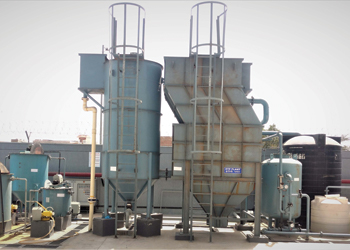f 28, 2024 Apr 18, 2020
Effluent Treatment Plants: Compliance and Environmental Impact Explained
Industries produce large volumes of wastewater that, if left untreated, can have severe consequences for both the environment and public health. This is where Effluent Treatment Plants (ETPs) come into play. These systems are essential for treating industrial wastewater, ensuring that harmful pollutants do not make their way into our water bodies.
Thermodynamic Services, a trusted provider of ETP Plants for industrial use in Kanpur, is committed to helping industries manage their wastewater effectively while staying compliant with environmental regulations. In this blog, we’ll explore the role of ETPs in compliance and environmental protection.
1. Understanding Regulatory Compliance
Industries face strict regulations when it comes to wastewater discharge. Governments and environmental agencies set these standards to protect water resources and public health. Failing to comply with these regulations can result in severe penalties, including fines, legal actions, and even the shutdown of industrial operations.
- Mandatory Standards: Regulatory bodies like the Central Pollution Control Board (CPCB) in India set specific standards for the quality of wastewater that industries can discharge. These standards include limits on the concentration of pollutants like heavy metals, chemicals, and organic waste.
- Regular Monitoring: Industries must regularly monitor their wastewater and report the results to regulatory agencies. This ensures continuous compliance and helps prevent environmental damage.
- Penalties for Non-Compliance: Industries that do not meet wastewater discharge standards face hefty fines. In some cases, repeated violations can lead to the revocation of operating licenses.
Fact: The CPCB mandates that all industries treat their effluent to meet the specified discharge standards. Non-compliance can result in fines of up to ₹500,000 per violation.
2. How ETPs Ensure Compliance
Effluent Treatment Plants play a crucial role in helping industries comply with these stringent regulations. By treating wastewater before discharge, ETPs remove harmful pollutants and ensure that the effluent meets regulatory standards.
- Pollutant Removal: ETPs are designed to remove a wide range of pollutants, including chemicals, heavy metals, and organic matter. This ensures that the treated water is safe for discharge into the environment.
- Customizable Solutions: Every industry has unique wastewater characteristics. ETPs can be customized to address specific pollutants, ensuring that the treatment process is tailored to meet regulatory requirements.
- Continuous Monitoring: Modern ETPs come equipped with monitoring systems that continuously measure the quality of the treated water. This allows industries to ensure ongoing compliance with discharge standards.
Statistic: Industries that invest in ETPs report a 90% reduction in non-compliance incidents related to wastewater discharge.
3. The Environmental Impact of ETPs
Beyond regulatory compliance, ETPs have a significant positive impact on the environment. By treating industrial wastewater, ETPs help preserve water resources, protect ecosystems, and promote public health.
- Preventing Water Pollution: Untreated wastewater can contaminate rivers, lakes, and groundwater, posing a threat to aquatic life and human health. ETPs prevent this by removing harmful substances before they can reach these water bodies.
- Supporting Ecosystems: Clean water is essential for maintaining healthy ecosystems. ETPs ensure that industrial effluents do not disrupt the delicate balance of aquatic environments, supporting biodiversity.
- Reducing Carbon Footprint: Many ETPs are designed to be energy-efficient, reducing the overall environmental footprint of industrial operations. By using less energy, these systems help industries lower their carbon emissions.
Fact: According to the World Health Organization (WHO), untreated industrial wastewater is responsible for 80% of the pollution in rivers and lakes in developing countries. ETPs play a critical role in reducing this pollution and protecting water resources.
4. Key Features of Effective ETPs
Not all ETPs are created equal. The effectiveness of an ETP depends on several key features that ensure it meets both compliance and environmental goals.
- Multi-Stage Treatment Process: Effective ETPs use a multi-stage treatment process that includes physical, chemical, and biological methods to remove pollutants. This comprehensive approach ensures that all types of contaminants are addressed.
- Automation and Control Systems: Modern ETPs are equipped with automation and control systems that optimize the treatment process and ensure consistent quality. These systems allow for real-time monitoring and adjustments, enhancing efficiency and compliance.
- Durability and Reliability: High-quality ETPs are built to withstand harsh industrial environments. They require minimal maintenance and offer long-term reliability, making them a cost-effective investment for industries.
Statistic: Industries that use high-quality ETPs report a 30% reduction in maintenance costs and a 25% increase in operational efficiency.
Why Choose Thermodynamic Services?
When it comes to selecting an ETP provider, you need a partner that understands your industry’s unique needs. Thermodynamic Services stands out as a leading provider of ETP Plants for industrial use in Kanpur. Here’s why you should choose us:
- Customized Solutions: We offer tailored ETP solutions that address the specific wastewater challenges of your industry. Our systems are designed to meet all regulatory requirements while delivering maximum efficiency.
- Expert Support: Our team of experts is dedicated to providing ongoing support, from installation to maintenance. We ensure that your ETP operates at peak performance, keeping your operations compliant and environmentally friendly.
- Proven Track Record: With years of experience and a strong track record of successful installations, Thermodynamic Services is a trusted partner for industries looking to improve their wastewater management.
Conclusion
Effluent Treatment Plants are essential for industries looking to achieve regulatory compliance and minimize their environmental impact. By investing in an efficient ETP, you not only protect your business from legal risks but also contribute to a cleaner, healthier environment.
Thermodynamic Services is here to help you make the right choice. As a leading provider of ETP Plants for industrial use in Kanpur, we offer solutions that ensure compliance, enhance operational efficiency, and protect the environment. Don’t leave your wastewater management to chance—choose Thermodynamic Services for reliable, effective, and customized ETP solutions.
Ready to take the next step? Contact Thermodynamic Services today to learn more about how we can help you stay compliant and environmentally responsible.

